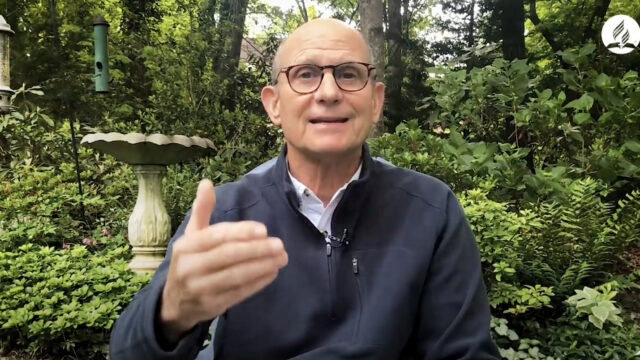AMEN president calls Adventist professionals to remember health is a means to an end.

After five years, the Adventist Medical Evangelism Network (AMEN) said good-bye to its president Brian Schwartz and welcomed president-elect John Shin during the evening program at the organization’s 2022 annual conference in Myrtle Beach, South Carolina, United States, on October 29.
AMEN board members thanked Schwartz profusely for his service at the helm of the organization that seeks to connect, train, and motivate Adventist health-care providers for mission.
“Doctor Schwartz became AMEN president at a difficult financial time for the organization,” leaders said, “but thanks to his hard work and God’s blessings, he’s leaving it in a much more solid position.”
Shin, who acknowledged to be “the first fruits” of the mentorship emphasis of the organization on behalf of new generations, thanked Schwartz and others and the trust of the AMEN board. “I feel I am the least qualified to fill this position, but I think it’s God’s ministry, and I will move forward on my knees,” Shin said.
The Purpose of AMEN
In the following minutes, Shin laid out his vision for the mission-driven and mission-focused organization.
“We are not just a club of like-minded people who share the same passion,” Shin said. “Medical ministry is not just another ministry.” He referenced Adventist Church co-founder Ellen G. White, who called medical ministry “the right arm of the gospel.” “You don’t have multiple right arms,” Shin said. “Medical ministry is the right arm.”
Shin also reflected on how Jesus used medical ministry when preaching about God’s Kingdom. “Jesus combined both because He knew it was the most effective way of doing mission,” he said. In that sense, Shin emphasized, “Our commission does not end because we are medical professionals with passion for service. We as health-care providers are in a prime position to teach others. We are not a club for medical professionals; we are the tip of the spear for medical ministry that should be embraced by everyone.”
Means to an End
According to Shin, AMEN must focus to engage not only medical professionals but all people. “If you see patients, we want you to be involved in AMEN,” Shin added. “We wish to train you, so you become a catalyst in your community. Train you and provide you with opportunities to serve.”
Shin said that this is just a natural result of nurturing our personal walk with Christ. “When you are connected to the vine, the branch cannot do anything else other than bearing fruit,” he reminded AMEN members.
It is the reason, Shin emphasized, why it is essential for Adventist providers to combine health-care service with ministry. “Otherwise, you fall into spiritual constipation: all input, no output,” he said. “Indeed, health without ministry is a bridge to nowhere.”
In expanding this thought, Shin explained that there is also what he called “a counterfeit health message,” when health becomes the ultimate objective. “It’s the health message without God” he said. “But health is a bridge to give us an unobstructed view of Christ. We cannot separate those two. Health is a means to an end.”
A Center of Hope and Healing
In the AMEN conference closing program, evangelist and AMEN co-founder Mark Finley reminded members what health ministry is all about and why it is important as a missionary tool. “These days, people are not so interested in a creed. They want to know that faith works, that there are people who serve unselfishly,” Finley said.
He reminded members that every person has the desire to live life fully, even in the 21st century. And to live fully, they need to see God’s character of love revealed through the unselfish service of God’s children. The peoples of the world “will feel drawn to a group of people more interested in the honor of God than in their honor or prestige. They will feel drawn to those not engaged in medical mercenary work but in medical missionary work. Medical ministry work matters because it is an extension of the healing ministry of Christ,” Finley said.
Finley also called AMEN members to remember that “Jesus wants us to live the life of abundance, knowing that everything is ours in Christ.” And “there’s nothing scarce when God gives you the abundant life.”
Against that background, he emphasized, “God’s desire for every medical office is to be a center of hope and healing.” He desires to see “men and women unselfishly serving, not consumed by themselves but focused on others.” And “as they serve lovingly, that is going to make a dramatic difference in their patients,” Finley said.
Finally, Finley suggested some questions Adventist professionals can use to probe for their patients’ real needs. “Is there anything else that I can do for you? Have there been any significant changes in your life in the last 12 months? Is there something troubling you? When you face a crisis, where are you likely to go for help? Does faith play any part at all in your life?” Finley asked. “Remember you are God’s eyes, God’s ears to your patients. So go from this place as an ambassador of the King of the universe to show His love,” he said.













